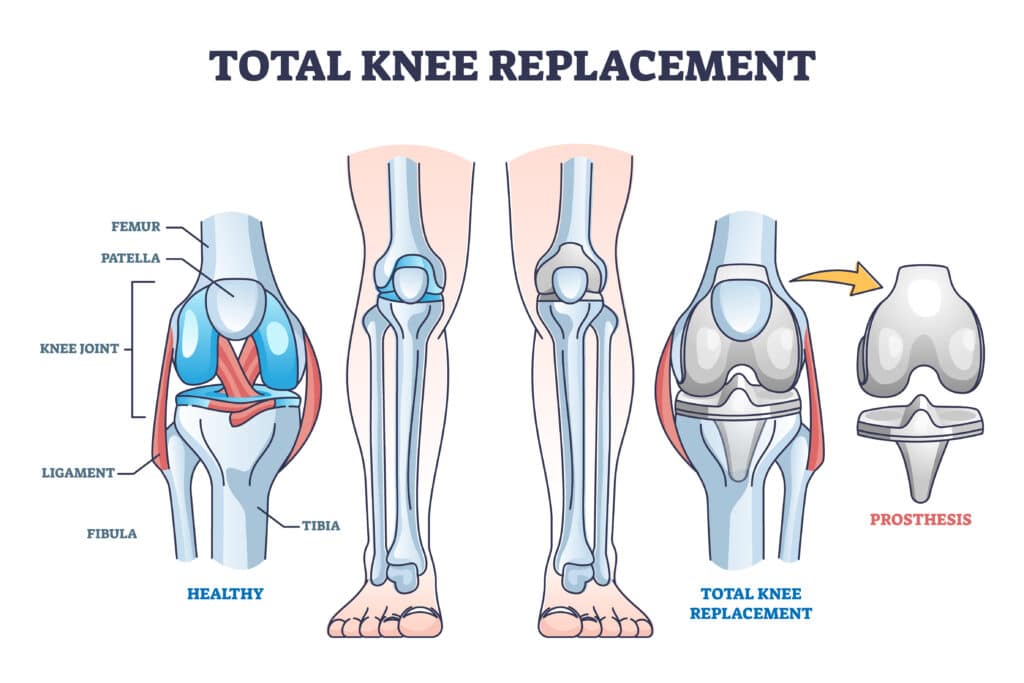Knee surgery can be a life-changing decision for those suffering from chronic knee pain or injury. If you’re considering knee surgery, it’s important to understand your options and evaluate whether this treatment is the right choice for you. Here’s a comprehensive guide to help you make an informed decision about knee surgery.
1. What is Knee Surgery?
Knee surgery encompasses various procedures aimed at addressing problems within the knee joint. These procedures may include arthroscopy, partial knee replacement, or total knee replacement. The goal of knee surgery is to alleviate pain, improve function, and enhance the quality of life for individuals suffering from knee conditions.
2. Types of Knee Surgery
- Arthroscopy: A minimally invasive procedure where a small camera and surgical instruments are inserted through tiny incisions in the knee. This technique is often used to diagnose and treat issues such as torn cartilage or damaged ligaments.
- Partial Knee Replacement: This surgery involves replacing only the damaged part of the knee with an artificial joint. It’s typically recommended for patients with arthritis confined to one area of the knee.
- Total Knee Replacement: In this procedure, the entire knee joint is replaced with an artificial joint. It’s generally recommended for patients with severe arthritis or extensive joint damage.
3. How to Determine if Knee Surgery is Right for You
Before deciding on knee surgery, consider the following factors:
- Severity of Symptoms: Evaluate the extent of your knee pain, stiffness, and functional limitations. If conservative treatments like physical therapy, medications, or injections haven’t provided relief, surgery might be considered.
- Impact on Daily Life: Assess how knee problems affect your daily activities and quality of life. If knee pain is significantly limiting your ability to perform routine tasks, surgery might be a viable option.
- Overall Health: Your general health and any underlying medical conditions can influence your suitability for knee surgery. A thorough evaluation by your orthopedic surgeon will help determine if you’re a good candidate for surgery.
4. What to Expect Before and After Knee Surgery
- Pre-Surgery: Prior to surgery, you’ll undergo a comprehensive assessment, including imaging tests and consultations with your orthopedic surgeon. You may also need to prepare by strengthening the muscles around your knee and addressing any health issues.
- Post-Surgery: After knee surgery, you’ll typically need a period of rehabilitation, which may include physical therapy to restore strength, flexibility, and function. Recovery times vary based on the type of surgery and individual health factors.
5. Benefits and Risks of Knee Surgery
- Benefits: Knee surgery can provide significant pain relief, improve joint function, and enhance overall mobility. For many patients, surgery leads to a better quality of life and increased ability to participate in activities they enjoy.
- Risks: As with any surgery, knee surgery carries potential risks, including infection, blood clots, and complications related to anesthesia. Discuss these risks with your surgeon to make an informed decision.
Conclusion
Deciding whether knee surgery is right for you involves a careful evaluation of your symptoms, overall health, and the potential benefits and risks of the procedure. Consulting with an experienced orthopedic surgeon can help you understand your options and determine the most appropriate treatment plan for your specific condition.
If you’re considering knee surgery and want expert advice, contact The Circle Care. Our team of specialists is dedicated to providing personalized care and helping you make informed decisions about your knee health. Reach out to us at info@thecirclecare.com or +201128821002 for more information and to schedule a consultation.
Frequently Asked Questions (FAQ)
1. What are the different types of knee surgery available?
Knee surgery encompasses several types of procedures, including arthroscopy, partial knee replacement, and total knee replacement. Arthroscopy is a minimally invasive procedure for diagnosing and treating knee issues, while partial knee replacement involves replacing only the damaged part of the knee. Total knee replacement replaces the entire knee joint with an artificial one.
2. How do I know if knee surgery is the right option for me?
Determining if knee surgery is suitable involves evaluating the severity of your symptoms, the impact on your daily life, and your overall health. If conservative treatments like physical therapy and medication have not provided sufficient relief, and knee pain significantly affects your ability to perform daily activities, knee surgery might be a viable option.
3. What should I expect during the recovery period after knee surgery?
Post-surgery recovery typically involves a rehabilitation period that may include physical therapy to regain strength, flexibility, and function in the knee. Recovery times vary based on the type of knee surgery and individual health factors. It’s essential to follow your surgeon’s recommendations for a successful recovery.
4. What are the potential risks associated with knee surgery?
Knee surgery, like any surgical procedure, carries potential risks such as infection, blood clots, and complications related to anesthesia. It’s important to discuss these risks with your orthopedic surgeon to understand the potential complications and make an informed decision about proceeding with the surgery.
5. How long does it take to see results after knee surgery?
The timeline for seeing results after knee surgery varies depending on the type of procedure and individual healing processes. Many patients experience pain relief and improved function within weeks to months following surgery. Your orthopedic surgeon will provide a more specific timeline based on your condition and the type of knee surgery performed.
[/vc_column_text][/vc_column][/vc_row][vc_row][vc_column]
-
CHECKME LABS-مختبرات تشيك-مي, ROYAL CHECKUP-فحوصات لجميع الفئات العمرية, WINTER IN EGYPT-الشتاء في مصر
CARDIAC PATIENT CHECKUP
Original price was: $50.$40Current price is: $40.There is no AI review summary.<span id="zoho_button_ext" style="position: absolute;z-index: 99999999;width: 80px;height: 31px;background-size: 80px 31px;cursor: pointer;top: 0px;left: 0px"></span> -
ROYAL CHECKUP-فحوصات لجميع الفئات العمرية
Check up Packages Vascular – Neuropathy
$250There is no AI review summary. -
ROYAL CHECKUP-فحوصات لجميع الفئات العمرية
Check- up Hypertension Packages
$250There is no AI review summary. -
ROYAL CHECKUP-فحوصات لجميع الفئات العمرية
Check-up Diabetes Packages 250
$250There is no AI review summary. -
ROYAL CHECKUP-فحوصات لجميع الفئات العمرية
Check-up Packages Diabetes100
$100There is no AI review summary. -
-
-
CHECKME LABS-مختبرات تشيك-مي, ROYAL CHECKUP-فحوصات لجميع الفئات العمرية, WINTER IN EGYPT-الشتاء في مصر
DIABETIC PATIENT CHECKUP PACKAGE
Original price was: $50.$40Current price is: $40.There is no AI review summary.<span id="zoho_button_ext" style="position: absolute;z-index: 99999999;width: 80px;height: 31px;background-size: 80px 31px;cursor: pointer;top: 0px;left: 0px"></span>












Leave a Reply